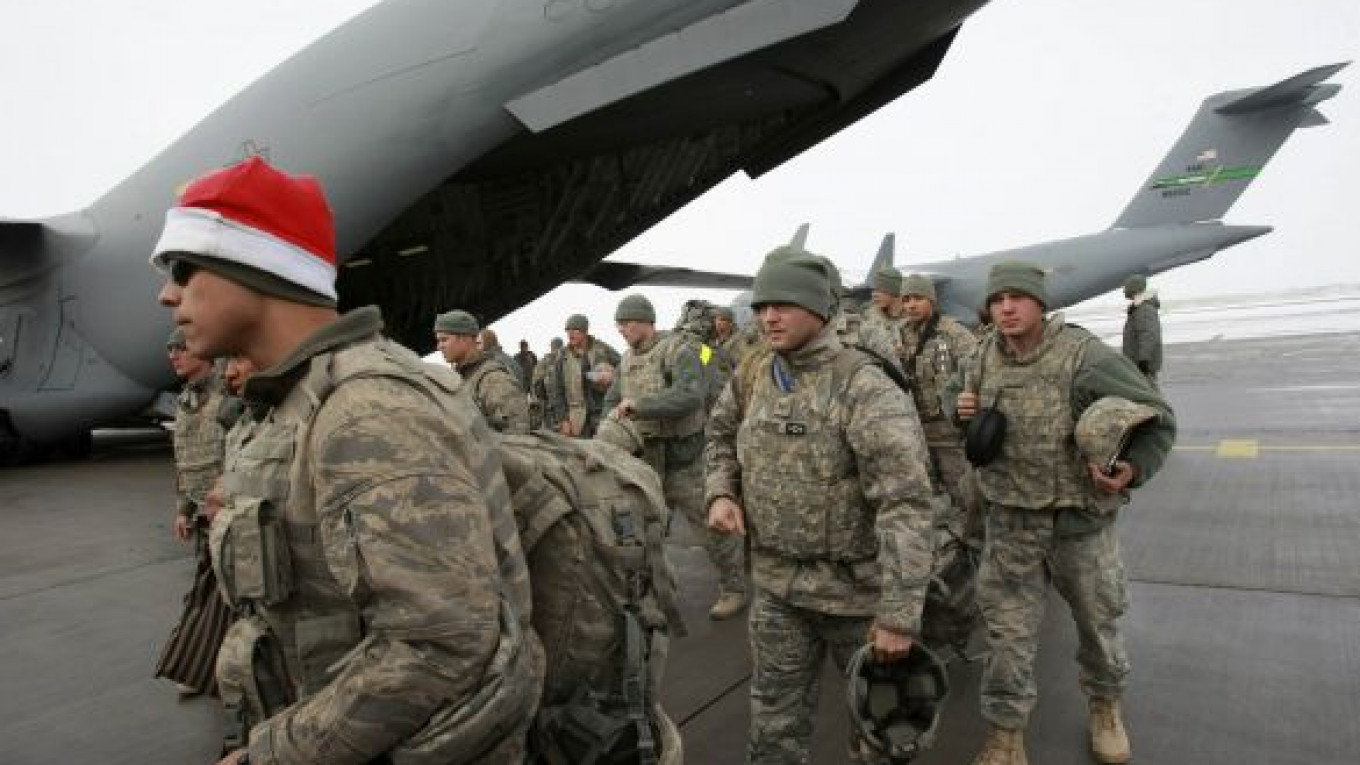WASHINGTON — The United States is increasingly relying on three transit routes snaking through Central Asia, Russia and the Caucasus to ship nonmilitary supplies and fuel into Afghanistan as the deteriorating relationship between Washington and Pakistan closes off border crossings, a Senate report says.
Use of the Northern Distribution Network to supply U.S. and coalition forces has been crucial in the ongoing war against terrorism and its role underscores the political and strategic importance of the Central Asian nations on the front lines of the conflict.
In broader security terms, the United States has invested millions in the former Soviet states — compared with billions spent on Afghanistan — but even that limited U.S. assistance could serve as a bulwark against the region’s major players, Russia and China, the report suggested.
The study found that just three years ago, about 90 percent of nonmilitary supplies to Afghanistan went through Karachi, Pakistan. Today, close to 75 percent of cargo is shipped through the northern network. Some 40 percent of cargo goes through the ground network, 31 percent is shipped by air, and 29 percent heads through Pakistan, the study said, citing figures from the military’s U.S. Transportation Command.
A supply route other than through Pakistan has become an imperative for the United States. Pakistan closed its two Afghan crossings in Chaman and Torkham, in the northwest Khyber tribal area, almost immediately after NATO aircraft attacked two army posts along the border on Nov. 26. The strikes killed 24 Pakistani troops. Last year, after U.S. helicopters accidentally killed two Pakistani troops, Islamabad closed Torkham for 11 days. It reopened the route after Washington formally apologized.
“Everybody’s hopeful we can get something back on track with Pakistan,” Senate Foreign Relations Committee Chairman John Kerry, a Democrat, said in an interview. “Pakistanis make money off that route. … That may interest them at some point … but on the other hand, we can’t be prisoners of one relationship with something as vital to our national security interests.”
The 25-page report by the Democratic staff of the committee follows a field visit by congressional aides to Kazakhstan, Kyrgyzstan, Tajikistan and Uzbekistan in October.
The network involves three routes to ship items like fuel, clothes, vehicles and other “nonlethal” supplies. One route begins in Poti, Georgia, a port on the Black Sea, goes through Azerbaijan, across the Caspian Sea and into Central Asia. A second route begins in Riga, Latvia, and extends through Russia, Kazakhstan and Uzbekistan. The third route also starts in Latvia and goes through Russia, Kazakhstan, Kyrgyzstan and heads into Afghanistan via Tajikistan.
While the United States has increased its reliance on the Northern Distribution Network, the report said it “is not a perfect substitute for the current supply routes in Pakistan. For example, the NDN only allows for one-way transit of goods to Afghanistan, though discussions are reportedly under way to expand the NDN to support two-way transit of cargo leaving Afghanistan via the northern routes.”
The network is also costly: an additional $10,000 per six-meter container to ship through the network compared with going through Pakistan.
Separate from the network, the United States relies on the Manas Transit Center in Kyrgyzstan to transport American and coalition forces. Manas also serves as an air-refueling site for aircraft heading to Afghanistan.
In highlighting the role of the five former Soviet states — Kazakhstan, Kyrgyzstan, Tajikistan, Turkmenistan and Uzbekistan — the report said modest U.S. investments in the region could produce a significant payoff, especially as the United States looks to stabilize Afghanistan for the planned U.S. drawdown through 2014. The prospect of U.S. troops leaving unnerves the region, the report said.
“Afghanistan’s neighbors fear that the 2014 security transition and withdrawal of coalition forces could mean abandonment,” the report said.
It said government officials told the Senate aides in meetings that they fear the transition will increase drug trafficking and create a security vacuum that extremist groups, such as the Islamic Movement of Uzbekistan and Islamic Jihad Union, would fill.
The report recommends economic assistance for some of the Central Asian nations and investments in English-
language training and public-private projects on cross-border electricity. The report said Russia is expanding its influence through military bases and commercial agreements, and may redeploy troops to the border of Tajikistan and Afghanistan.
“You look at things like flood control or seeds for crops, or cattle for a community, or things like that, that are not that expensive,” Kerry said. “Boy does that make a difference.”
A Message from The Moscow Times:
Dear readers,
We are facing unprecedented challenges. Russia's Prosecutor General's Office has designated The Moscow Times as an "undesirable" organization, criminalizing our work and putting our staff at risk of prosecution. This follows our earlier unjust labeling as a "foreign agent."
These actions are direct attempts to silence independent journalism in Russia. The authorities claim our work "discredits the decisions of the Russian leadership." We see things differently: we strive to provide accurate, unbiased reporting on Russia.
We, the journalists of The Moscow Times, refuse to be silenced. But to continue our work, we need your help.
Your support, no matter how small, makes a world of difference. If you can, please support us monthly starting from just $2. It's quick to set up, and every contribution makes a significant impact.
By supporting The Moscow Times, you're defending open, independent journalism in the face of repression. Thank you for standing with us.
Remind me later.






